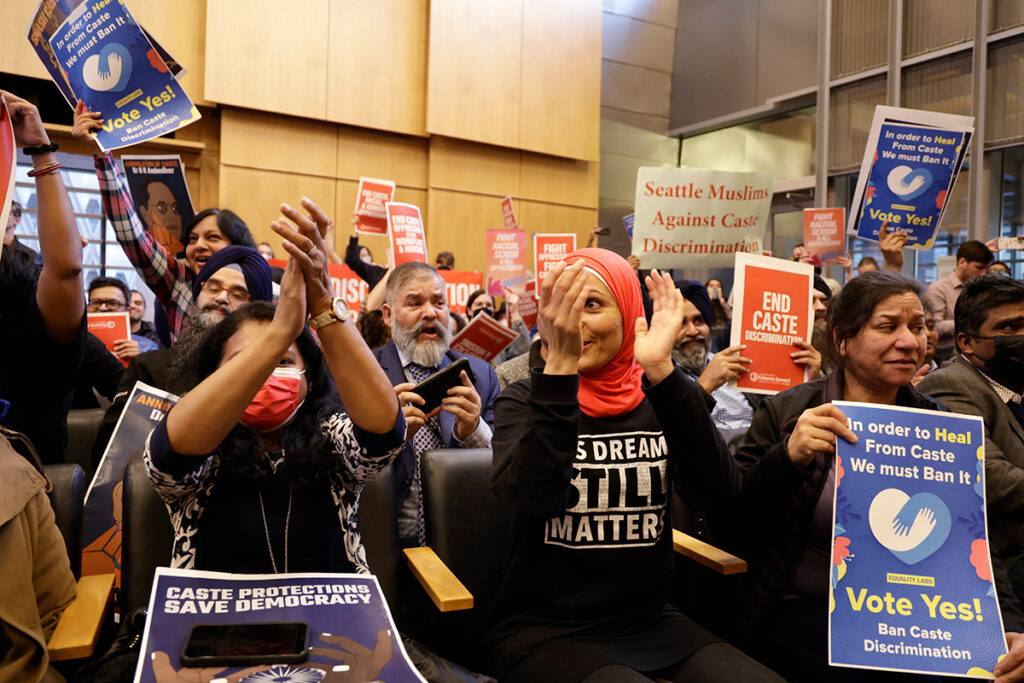Volcanoes are erupting in The Philippines, but on-fire Australia received some welcome rain. The Iran war cries have been called off and The Donald’s military powers are about to be hamstrung by the Senate. Meanwhile, his impeachment trial is starting, and we’re all on Twitter for a front-row seat.
Progress in 5 Minutes: Caste as protected category
With Seattle's historic move to ban caste discrimination, along with recently added protections at some US universities, momentum is growing.

Seattle recently became the first city in the United States to ban discrimination based on caste status, the rigid, millennia-old social classification that divides people in India and other South Asian countries and diaspora communities. In fact, Seattle was the first city beyond South Asia to add the protection, and joins a growing roster of American universities and companies that are adding caste to their anti-discrimination policies.
Though an estimated 250 million people worldwide suffer from caste oppression, for those with little knowledge of or connection to South Asia, these protections might seem like a niche issue. But according to Thenmozhi Soundararajan, Executive Director of Equality Labs, which advocates for the civil rights of caste-oppressed people, South Asians are among the largest minority groups worldwide, and with 5.7 million South Asian Americans in the US, they are “part of every institution” and industry.
Defining caste
Caste is a 3,000-year-old exclusionary social hierarchy system outlined in Hindu texts that is observed in India, Nepal, Pakistan, Bangladesh, and South Asian diaspora communities. There are four main castes: Brahmins (priests), Kshatriyas (warriors), Vaishyas (traders), and Shudras (artisans and laborers). At the lowest classification, outside of the system, are Dalits (Dalit means “broken,” and this group is perhaps better known as “outcastes” or “untouchables”). Though the system originated in Hinduism, South Asians of other religions have a subscribed caste as well.
Caste determines the type of jobs one works, and because Dalits are believed to be “spiritually defiling,” they are regulated to the lowest occupations, such as cleaning sewers or handling dead bodies. Historically, Dalits have been forced to live in segregated neighborhoods and barred from using roads and entering Hindu temples. The Indian Constitution explicitly bans caste discrimination, but Dalits continue to be the targets of oppression and violence.
In 2020, an unnamed principal engineer at Cisco filed a lawsuit against the technology company, saying that he was harassed because he was Dalit, that two of his managers reinforced caste hierarchy, and that he was reassigned and passed over for a pay raise and two promotions. The Cisco case is among the first caste discrimination cases in the US, though South Asian Americans working in the tech industry have long said that they are discriminated against due to their caste and are subject to slurs, jokes, and leading questions about their background, including being “outed” as Dalit. Silicon Valley has long tapped talent from India through highly skilled worker visas, and following the lawsuit, the industry has started to work to address casteism in company politics and culture.
A 2021 Pew Research survey found that 30 percent of Indians identify as “General Caste,” a grouping of the higher castes, and nearly 70 percent of Indians identify as being Dalit or part of an indigenous group that is socially disadvantaged. A 2021 Carnegie Endowment survey found that half of all Hindu Indian Americans had a caste identification, with the majority, eight out of ten, belonging to the higher castes.
A 2018 report by Equality Labs was the first to document caste in the US, surveying about 1200 Dalit Americans. Key findings were that 25 percent of Dalits have faced verbal or physical assault, one in three have been discriminated against in education, and two out of three have experienced unfair work treatment because of their caste.
Seattle’s historic move
More than 167,000 people of South Asian descent live in Washington State, primarily in Seattle. South Asians are the city’s fastest growing ethnic group. The Seattle ordinance, passed in late February of 2023, was sponsored by Kshama Sawant, the sole Indian American among the city’s nine city councilmembers. Letters in support of the ordinance were sent from high-profile civil rights activists, including Dr. Cornel West and Soundararajan from Equality Labs, as well as from advocacy organizations like Asian American Disinformation Table, Asian Pacific American Labor Alliance, and labor unions. Opponents of the ordinance, including the Hindu American Foundation, argued in part that employers might avoid hiring South Asian workers in fear of them alleging discrimination.
Practically, the move includes caste among the groups protected by the city’s anti-discrimination policies, and allows those affected by caste discrimination to have their claims investigated by the Seattle Office of Civil Rights, the findings of which could later be used in a legal case. The Seattle Times reported that caste-based discrimination would cover other communities, including the Roma people, Japanese Burakumin, minority groups from Somalia, and more. The article also noted that there are currently about 70 ongoing discrimination investigations in the city.
Caste comes to America
Though it took until the Cisco lawsuit in 2020 for a caste discrimination case to make its way through the US courts, caste arrived in the US and Canada in the late 1800s with a wave of Indian immigrant laborers and was challenged by court cases in the early 1900s following the US Naturalization Act of 1906, which in part limited citizenship to whites and people of African descent.
In 1912, A.K. Mozumdar, a spiritual teacher born to a Brahim family in India, argued that his high-caste status in India and Aryan background should qualify him as white. His US citizenship was granted the following year, and as Spokane Historical summarizes, though “the precedent did not help Hindus of lower castes or Sikhs, who made up most of the Indians then living in the US, it did create a path to citizenship for a number of other Hindus.” Mozumdar’s citizenship was revoked a decade later with the 1923 Supreme Court decision United States v. Bhagat Singh Thind, which found that Thind, a high-caste Sikh who served in the US Army during World War I, was ineligible to become a citizen on the basis of race (Thind also identified as Aryan). In 1965, Congress eliminated race-based quotas for good, opening up immigration to Asian and other non-European people.
In 2001, Lakireddy Bali Reddy, a high-caste Indian American restaurateur who owned more than a thousand rental properties in Berkeley, California, was convicted of running a human trafficking ring, bringing an estimated 25 Dalit women and girls from his home village in India to the US for sex and their labor in his businesses. (Reddy was prosecuted for human trafficking, not specifically for caste discrimination.) More recently, in 2021, a class action lawsuit alleges a temple in Robbinsville Township, New Jersey brought some 200 low-caste Indians to America to work as religious volunteers on R-1 visas; the victims allege they were forced to work 13-hour days, seven days a week with no time off, and earned about $1 an hour. “Their caste position was used by the employer, and the entities affiliated with the employer, as a way to keep them subjugated or keep them constrained and feeling like they didn’t have any options,” said Patricia Kakalec, one of the lawyers representing clients in the case.
Growing momentum
Soundararajan, from Equality Labs, said that though the Seattle ordinance was introduced and passed in February 2023, the monumental move was the result of a decade of work among Dalits, feminists, and other political groups, especially labor unions. Dalits who do speak out are often subject to smear campaigns and doxxing; Soundararajan herself has faced rape and death threats.
In December 2022, Brown University became the first Ivy League school to ban caste discrimination. Earlier in the year, the California University system added caste as a protected class in their anti-discrimination policy, and in March, California State Senator Aisha Wahab introduced a bill similar to the one passed in Seattle. The momentum is expected to continue. “The next generation is decidedly anti-caste,” Soundararajan said. “People around the world are talking about caste as a protected category, and the time is up for being openly bigoted.”



how is one identified by cast?